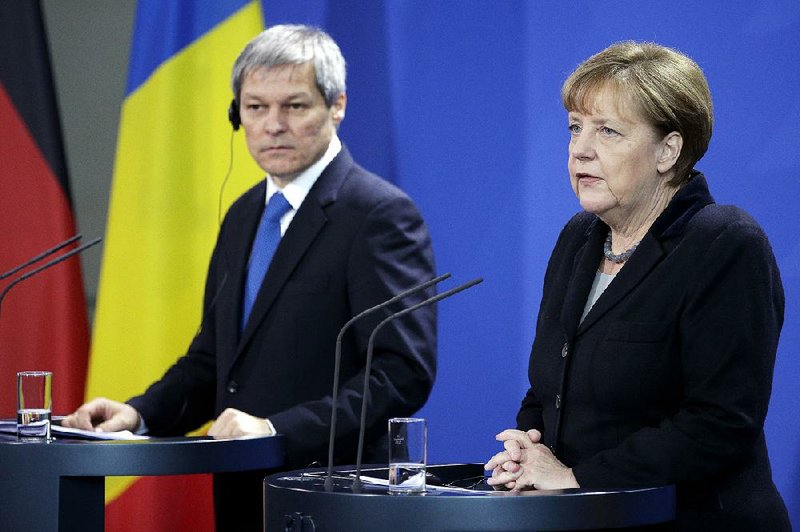AMSTERDAM -- The European Union said Thursday that Turkey wasn't doing enough to decrease the number of people making the dangerous crossing into Greece and beyond to the continent's heartland, where many EU nations are struggling to cope with the influx of migrants and refugees.
European Commission Vice President Frans Timmermans said the EU is "a long way from being satisfied" with the effort from Ankara so far, especially after offering more than $3.2 billion in aid and political concessions -- like an easing of visa restrictions and the fast-tracking of its EU membership process -- only two months ago.
Germany alone has said that about 3,200 people are arriving each day, many through Turkey, and that numbers haven't declined despite commitments to do something about the situation. In all, nearly 1.1 million people were registered as asylum seekers in Germany last year, more than 400,000 of them from Syria.
"There is still a lot of work to do there," said Timmermans, who plans to host talks in Ankara Monday to discuss progress and see how the EU aid can be used there to deal with the Syrian refugee crisis. Turkey is supposed to tighten border security and take back some migrants who don't qualify for asylum in Europe.
"We will continue in our efforts to make sure that we deliver the results that we agreed with Turkey," Timmermans said.
Beyond seeking to contain the refugee crisis by helping Turkey to better keep people from crossing into the EU, the continent also is trying desperately to bolster its porous external borders, especially in the Mediterranean to try to decrease the number of fatal accidents in 2016 compared with last year.
The EU's reaction has been varied at best, with several nations imposing internal border checks again and few member states stepping up to help ease the burden on countries like Germany and Sweden, which have been among the primary destinations for refugees and asylum seekers.
"There is no solution in going national like this," Timmermans told a few journalists. "Nobody should have the illusion that this is a long-term solution."
German Chancellor Angela Merkel, meanwhile, was calling on her European allies to better share responsibility to deal with the migrant crisis.
"I don't want to make any concrete threats here ... but I would like to say that a Schengen [border-free travel] system can only work if joint responsibility is taken for refugees and joint responsibility is taken for protecting external borders," Merkel said after meeting her Romanian counterpart Thursday.
But finding that common resolve will be a key challenge in 2016, with many central and eastern European nations refusing to enter such sharing deals by taking more people in for shelter.
Slovak Prime Minister Robert Fico's government has already filed a legal challenge last month to a mandatory EU plan to distribute migrants among members of the bloc.
On Thursday, Fico said his government sees what he calls a "clear link" between the waves of refugees and the Paris attacks, and the sexual assaults and robberies during the New Year's Eve festivities in Germany.
"We don't want what happened in Germany to happen here," he said, adding that "the idea of multicultural Europe has failed" and that "the migrants can't be integrated. It's simply impossible."
Meanwhile, Turkish media reported that hundreds of life vests sold to Syrian migrants in the Turkish port city of Izmir were likely fake. The Associated Press, citing Turkish reports, said the roughly 1,200 flotation devices sold there were made of a material that becomes heavy when soaked and would have caused their wearers to sink.
In one report, Turkish police raided a workshop in Izmir and found workers stuffing the life jackets with packaging rather than buoyancy aids, the BBC reported.
Since smugglers don't usually provide life jackets, migrants must acquire them on their own. A properly made jacket costs up to $150, the BBC reported.
An improperly made jacket may cost as little as $15 but has almost no hope of floating. Many migrants, lacking cash but desperate for some semblance of protection, will still buy them.
On Thursday, police in Izmir also collected about 300 substandard vests from Syrian migrants who had already purchased them, the Hurriyet newspaper reported.
Sait Guderoglu, one of Turkey's top life-vest producers, told Hurriyet that the fake life vests can endanger wearers even more than no vest at all.
"Such life jackets are made of backpack material and filled with sponge, and because sponge is hydrophilic [water absorbing], it drags people down and causes them to drown," he said.
More than 3,700 people died attempting to cross the Mediterranean during 2015, the International Organization for Migration reported this week. It was the deadliest year on record for migrants and refugees in the region.
Information for this article was contributed by Raf Casert of The Associated Press and by Sarah Kaplan of The Washington Post.
A Section on 01/08/2016


